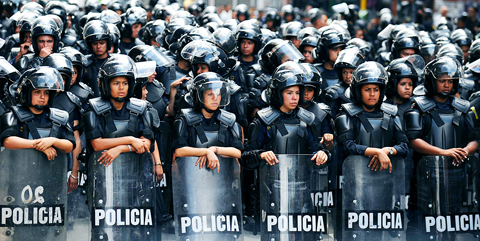Venezuelan President Hugo Chavez is threatening to close Venezuela’s top anti-government television station in his latest push to weaken the opposition and build a socialist state.
Chavez has already moved against his opponents this year with measures that include stripping control of half of Caracas from the capital’s newly elected mayor and opening corruption investigations against several leaders.
Media-savvy Chavez, known for hours-long speeches often broadcast on all terrestrial channels, now has his critics’ main remaining channel, Globovision, in his sights as his government is reviewing licenses of all private stations.

PHOTO: AFP
Globovision’s closure would draw international criticism but be popular with Chavez’s hardcore supporters. Opposition outrage at such a move would unlikely extend to the wider population, only a small part of which watches the channel.
“Nobody in Venezuela should be surprised if the state takes decisions about certain media companies that are practicing terrorism in our country,” Chavez said last week during a visit to Argentina.
Two years ago he refused to renew the license of the nation’s favorite network RCTV, implicated in a brief coup against him in 2002. International watchdogs said that decision attacked the freedom of expression.
Thousands of students marched on Wednesday in Caracas, some carrying banners bearing Globovision’s logo.
Known for its vehemently anti-government stance, Globovision is accused by Chavez and his supporters of fomenting civil unrest. Most recently the government took exception to its coverage of an earthquake.
Globovision is a small station dedicated to news. It may still broadcast on cable if it loses its terrestrial license. As a mainstay of opposition politics, its closure would be a symbolic blow even though Chavez’s critics will still have access to the OPEC nation’s main newspapers and radio stations.
Less politicized private stations that show soaps, gameshows and more balanced news have the highest ratings and are far more popular than government-run networks.
Chavez has made several threats to Globovision and its owner Alberto Ravell in recent days. On his widely watched weekly television show last week, he said that the “lunatic” Ravell and Globovision would “be finished, or I’m not called Hugo Chavez.”
One media group, owned by mogul Gustavo Cisneros, has softened its former anti-government tone since the coup, but Globovision rarely backs away from a fight with Chavez and is favored by opposition politicians to get their message out.
“Venezuela’s first media terrorist is President Chavez, who every day verbally attacks any sector of the country that does not agree with him,” Ravell said on Tuesday.
RCTV, which lost its terrestrial license two years ago, and Globovision both gave airspace to army officers involved in a short-lived coup against Chavez in 2002.
The decision meant Venezuela’s favorite TV channel, source of highly watched soap operas, disappeared from the airwaves, sparking protests and contributing to Chavez’s defeat in a referendum that would have given him broad new powers.
But the move barely dented Chavez’s long-term popularity and he again enjoys approval ratings above 60 percent despite oil income falling by a half so far this year.

Tens of thousands of Filipino Catholics yesterday twirled white cloths and chanted “Viva, viva,” as a centuries-old statue of Jesus Christ was paraded through the streets of Manila in the nation’s biggest annual religious event. The day-long procession began before dawn, with barefoot volunteers pulling the heavy carriage through narrow streets where the devout waited in hopes of touching the icon, believed to hold miraculous powers. Thousands of police were deployed to manage crowds that officials believe could number in the millions by the time the statue reaches its home in central Manila’s Quiapo church around midnight. More than 800 people had sought

DENIAL: Pyongyang said a South Korean drone filmed unspecified areas in a North Korean border town, but Seoul said it did not operate drones on the dates it cited North Korea’s military accused South Korea of flying drones across the border between the nations this week, yesterday warning that the South would face consequences for its “unpardonable hysteria.” Seoul quickly denied the accusation, but the development is likely to further dim prospects for its efforts to restore ties with Pyongyang. North Korean forces used special electronic warfare assets on Sunday to bring down a South Korean drone flying over North Korea’s border town. The drone was equipped with two cameras that filmed unspecified areas, the General Staff of the North Korean People’s Army said in a statement. South Korea infiltrated another drone

COMMUNIST ALIGNMENT: To Lam wants to combine party chief and state presidency roles, with the decision resting on the election of 200 new party delegates next week Communist Party of Vietnam General Secretary To Lam is seeking to combine his party role with the state presidency, officials said, in a move that would align Vietnam’s political structure more closely to China’s, where President Xi Jinping (習近平) heads the party and state. Next week about 1,600 delegates are to gather in Hanoi to commence a week-long communist party congress, held every five years to select new leaders and set policy goals for the single-party state. Lam, 68, bade for both top positions at a party meeting last month, seeking initial party approval ahead of the congress, three people briefed by

Cambodia’s government on Wednesday said that it had arrested and extradited to China a tycoon who has been accused of running a huge online scam operation. The Cambodian Ministry of the Interior said that Prince Holding Group chairman Chen Zhi (陳志) and two other Chinese citizens were arrested and extradited on Tuesday at the request of Chinese authorities. Chen formerly had dual nationality, but his Cambodian citizenship was revoked last month, the ministry said. US prosecutors in October last year brought conspiracy charges against Chen, alleging that he had been the mastermind behind a multinational cyberfraud network, used his other businesses to launder